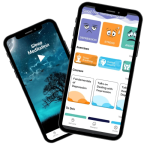Online Bipolar Disorder Therapy | Best Therapist For Bipolar Disorder Help
- Setup a free & confidential chat on your bipolar disorder issues
- Unlimited help through bipolar disorder self-care app
- Live Video or Chat sessions with top bipolar disorder therapists
Begin Therapy
Consult online with best Therapist
Get the best help for Bipolar Disorder
TherapyMantra is here to help you on your path to recovery from bipolar disorder. We match you with the best bipolar disorder therapists available 24/7 via video call or messaging.
Match with bipolar disorder Therapists
We assign the best counsellors experienced in bipolar disorder issues based on your needs.
Affordable and Effective
Our online sessions are 90% less expensive than in-person therapy, available 24/7.
Self-Care for bipolar disorder
We offer ongoing bipolar disorder support through self-care tools, bipolar disorder help videos, chat groups, meditations, breathing exercises, and other resources.

Wondering if it’s just a phase or something more? Take our Free online bipolar disorder test to find out?
How it works?
You are matched with a bipolar disorder counsellor based on your needs and preferences. You get a secure “therapy room” where you can communicate with your counsellor via chat or phone. You can write or talk about bipolar disorder & ask questions to deal with bipolar disorder.

Register for bipolar disorder Counseling
Simply complete a 5-minute online form to tell us about your bipolar disorder issues

Consult with your bipolar disorder Therapist
We connect you with bipolar disorder counsellors who are available 24/7 based on your preferences and needs.

Connect to Our App
Apart from Video / chat sessions, our app offers self-care tools, videos and meditations to help you deal with your bipolar disorder.
Best Bipolar Disorder Therapists
Positive conversations, exercises, and meditations are used by TherapyMantra psychologists to help you deal with bipolar disorder. Our bipolar disorder therapists outperform traditional counselling as you get matched from a pool of 500+ bipolar disorder counsellors, who offer 24/7 unrestricted private chat.








What is Bipolar Disorder?
Bipolar disorder is a mental illness that causes extreme mood swings, from manic highs to depressive lows. These mood swings can be so severe that they interfere with a person’s ability to function normally in everyday life. The symptoms of bipolar disorder can vary from person to person, but some of the most common symptoms include:
- Mania: extreme elation, excessive energy, racing thoughts, poor judgment
- Depression: Feelings of sadness, emptiness, hopelessness, worthlessness, fatigue
- Irritability: short temper, frustration, easily annoyed
- Changes in sleeping habits: insomnia or oversleeping
- Changes in eating habits: excessive hunger or loss of appetite
- Difficulty concentrating
- Thoughts of suicide
Bipolar disorder can affect anyone, regardless of age, race, or gender. However, it is more common in people who have a family history of bipolar disorder or mental illness.
Types of Bipolar Disorder
There are four main types of bipolar disorder:
- Bipolar I Disorder: Characterized by a single manic episode, followed by a period of normal mood.
- Bipolar II Disorder: Characterized by recurrent episodes of hypomania and depression.
- Cyclothymic Disorder: Characterized by numerous periods of hypomania and mild depression.
- Bipolar Disorder NOS: Not Otherwise Specified, which is used when a person has symptoms of bipolar disorder but does not meet the specific criteria for any of the three types listed above.
Treatment options for Bipolar Disorder
- Medication – There are a number of medications that can be used to treat Bipolar Disorder.
- Mood stabilizers
- Antidepressants
- Anti-psychotics
- Counseling – Therapy can help people with bipolar disorder learn to cope with their illness. It can also help them develop better-coping skills and improve their relationships.
- Education – Learning about bipolar disorder can help people understand it better and take steps to manage their own health.
There is no one-size-fits-all approach to treating bipolar disorder. The best treatment plan depends on the individual’s needs and situation. Treatment may need to be adjusted over time as the person’s symptoms change. With the help of a doctor or therapist, it is possible to manage bipolar disorder and live a full and productive life.
How can therapy help with Bipolar Disorder?
There is no one-size-fits-all answer to the question of how therapy can help with bipolar disorder. However, some things that may be helpful include:
1) Learning about BD and its symptoms
2) Identifying and managing triggers for mood episodes
3) Developing coping skills for dealing with difficult emotions
4) Learning how to problem-solve and manage stress
5) Receiving support from a therapist or group
6) Developing a medication plan with a doctor
7) Monitoring mood symptoms regularly
8) Participating in therapy for bipolar disorder can help reduce the number and severity of mood episodes, improve relationships, and increase overall functioning.
If you or someone you know is struggling with bipolar disorder, seeking professional help is the best step. A therapist can provide guidance and support as you work to manage this condition.
Therapy options for Bipolar Disorder
There are several types of therapy including:
- Cognitive Behavioral Therapy (CBT)
- Interpersonal and Social Rhythm Therapy (IPSRT)
- Family-Focused Therapy (FFT)
The goal is to get the right combination of medication and therapy so that you can manage your bipolar disorder and live a full life. You may need to try different medications and therapies to find what works best for you.
- Cognitive Behavioral Therapy (CBT) is one type of therapy that is effective in treating bipolar disorder. CBT helps you understand how your thoughts and feelings affect your moods and behavior. CBT can help you learn how to change your thoughts and behavior to manage your bipolar disorder.
- Interpersonal and Social Rhythm Therapy (IPSRT) is another type of therapy that is effective in treating bipolar disorder. IPSRT helps you manage your moods by teaching you how to keep a regular daily routine and social schedule. This therapy can help you stay on track and avoid triggers that can cause a bipolar episode.
- Family-Focused Therapy (FFT) is a type of therapy that helps families affected by bipolar disorder. FFT teaches families how to support their loved ones with bipolar disorder and how to deal with the challenges of the illness. This therapy can help families learn how to cope with bipolar disorder and improve communication.
If you are struggling with bipolar disorder, it is important to find the right combination of medication and therapy. Talk to your doctor about the different options available to you.
How to find a bipolar disorder therapist?
TherapyMantra can help you find a bipolar disorder therapist near you. We have over 500+ therapists listed on our therapist directory. You can follow the following steps to find a good bipolar disorder therapist:
- First, ask your family doctor or anyone else you are seeing for a referral for a bipolar disorder therapist.
- The next thing you’ll want to do is ask your friends and loved ones for referrals.
- The next thing you’ll want to do is look online. There are many websites that help people find therapists in their area who can treat things like bipolar disorder.
10,000+ Happy & Healed Bipolar Disorder patients

“I’m 45 years old and have had Bipolar Disorder for the past 16 years. My mother had paranoid schizophrenia 25 years ago. We were children at the time, the four of us, and we had no idea what mental illness was. Then we came across the therapy sessions by Mantra Care. We feel blessed after meeting them.”
Kevin,
1 year on TherapyMantra
FAQs
People with bipolar disorder have episodes of severe depression as well as episodes of mania, which include overwhelming joy, excitement, or happiness, a high level of energy, a reduced need for sleep, and lowered inhibitions. Bipolar disorder is a highly individual experience. Nobody has the same experience as another.
Bipolar disorder – or manic depression, as it is sometimes referred to – has no known cure. It is a chronic health condition that must be managed for the rest of one’s life. Many people with this condition are successful; they have families, work, and live normal lives.
Absolutely. Is it possible for someone with bipolar disorder to have a normal relationship? Yes, with your and your partner’s help. When someone you care about suffers from bipolar disorder, their symptoms can be debilitating at times.
So, the bottom line is that if you have bipolar disorder, you were probably predisposed to it from birth, and for many people, a stressful life event and/or upbringing can trigger the onset of the illness. It’s important to remember that what one person finds stressful may not be so for another.
A bipolar disorder diagnosis requires at least one depressive episode and one manic or hypomanic episode. Your mental health professional will inquire about your thoughts and feelings during and after these incidents. They’ll want to know if you feel in control during your manic episodes and how long they last.
Exercise can help with bipolar disorder symptoms by releasing endorphins, which are chemicals that boost your mood and feelings of well-being. Other chemicals associated with good moods that are typically low in people with depression, such as dopamine, serotonin, and norepinephrine, are released.
Because they don’t feel good enough for other people, a bipolar person may avoid relationships. These feelings can be overwhelming at times, causing those suffering from mental illnesses to withdraw from others in existing relationships.


